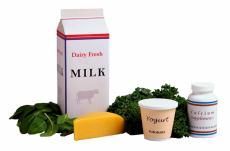Calcium Reduces Risk Of Kidney Stones, Even In Non-Dairy Foods

Whether from milk products or not, the consumption of calcium-rich foods significantly lowers the risk of developing kidney stones, a new study shows.
A large-scale analysis of dietary calcium bolstered previous studies demonstrating a 20 percent lowered risk for kidney stones but confirmed the effect isn't limited to calcium from milk products.
Prior to the study, some researchers had believed dietary calcium had contributed to the formation of kidney stones, which are made of calcium oxalate. "This is another piece of data to suggest that there's no role for dietary calcium restriction for kidney stones," said lead investigator Dr. Eric Taylor, a kidney specialist at Maine Medical Center in Portland, whose team reported in the Journal of Urology.
Taylor and his colleagues initiated the study to determine whether calcium in milk or some other component was responsible for the reduction in kidney stone risk, studying calcium in non-dairy products. They conducted a meta-analysis of three large studies that followed more than one million people over multiple years, even decades.
The researchers divided the study subjects into five groups based on their levels of calcium consumption from dairy and other sources over the years-long period. In their analysis, they included only those subjects who did not suffer pre-existing conditions prior to data collection in the studies.
For people who consumed calcium from both dairy and non-dairy sources, the risk of kidney stones averaged 77 percent of the risk experienced by those who consumed the least amount of calcium, the researchers reported in the Journal of Urology. Among those consuming calcium derived primarily from dairy products, those with the lowest calcium consumption experienced a 30 percent higher chance of developing kidney stones. For non-dairy foods, those who consumed less calcium were twice as likely to develop the condition.
In the study, researchers defined high-calcium dairy consumption as 800 to 900 milligrams per day, or approximately three glasses of milk, compared with just 150 milligrams per day, or about a half-glass of milk. For non-dairy consumers, researchers defined high-calcium as 450 milligrams per day compared to 250 milligrams per day, the amount in eight ounces of cooked kale or just two sardines, for example.
Thus, researchers estimated the normal risk for kidney stones in the United States, approximately 6 percent, is doubled by lowered consumption of calcium, meaning people who eschew dairy for any reason might wish to consume much more kale, for example.
Researchers also warned people concerned about kidney stones to ask a physician before changing their diet, saying some reduce misguidedly reduce calcium intake. In actuality, oxalate - found in fruits, vegetables, nuts and chocolate - is responsible for kidney stones. Calcium in the digestive tract binds to oxalate before the latter is absorbed into the bloodstream to wend its way to the kidneys and bile duct, where problems happen.
Dr. Matthew Sorensen, a urologist at the University of Washington in Seattle, says many patients fail to understand the relationship.
"I see patients every week, and most have cut back on their calcium intake," Sorensen said.. "It is one of the most important myths in the stones world that needs to be corrected."
Sorensen also advised people to refrain from over-doing it on calcium, sticking with moderate levels of approximately 1,000 to 1,200 milligrams per day - or five to six servings of kale.
Published by Medicaldaily.com



























